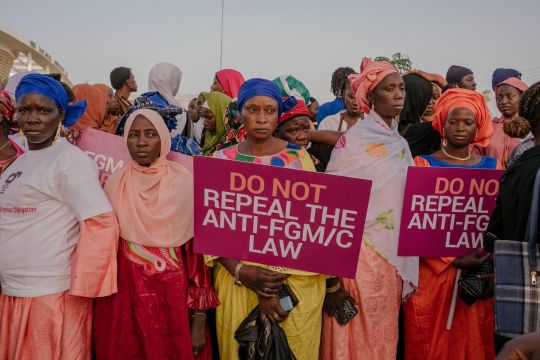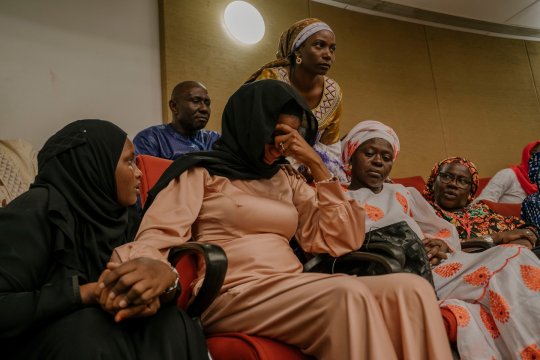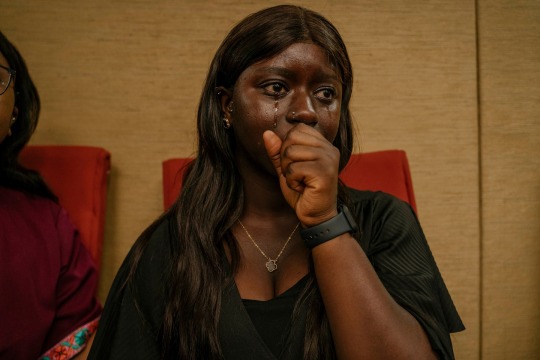#gambia
Explore tagged Tumblr posts
Text

“A women and big clay jars.” Garawol village, Kantora District, Upper River Division, The Gambia, c.1968
74 notes
·
View notes
Text






BAHNA 🇬🇲🇸🇳 by Ciesay
132 notes
·
View notes
Text

gambian miku ‼️ I wanna join this trend so #HatsuneMiku by lumincresc
131 notes
·
View notes
Text

Very important and heartbreaking news.
(Organizations to support at the end of the post)
March 19th, 2024
https://www.washingtonpost.com/world/2024/03/19/gambia-female-genital-mutilation-cutting/
Gambia moves towards ending ban on female genital mutilation
Gambia’s National Assembly has voted to advance a bill that would overturn a ban on female genital cutting, putting this tiny West African country on a path to being the first nation in the world to roll back such a protection.
Many of the women who filed into the National Assembly building on Monday to witness the proceedings had experienced the horror that comes with cutting, which has been practiced for generations here. One woman said she was taken by her family at age 8 to a ceremony in which she was pinned down and cut. Another learned on her wedding night that her vaginal opening had been sealed. A third experienced years of infections and later infertility after being cut without her parents’ permission.
The women listened stoically as members of parliament — the vast majority of them men — pounded their gavels in support as Almameh Gibba, the lawmaker who introduced the bill, described it as intended to “uphold religious rights and safeguard cultural norms and values.” (...)
Already, the United Nations says that about 75 percent of girls and women in Gambia between the ages of 15 and 49 have been subjected to genital cutting, which is often described by opponents as female genital mutilation, or FGM. Globally, more than 200 million women and girls are estimated to be survivors of female genital cutting, which can involve removing part of the clitoris and labia minora and, in the most extreme cases, a sealing of the vaginal opening. Medical experts say the procedures, which do not have medical benefits, can cause a range of short- and long-term harms, including infections, severe pain, scarring, infertility and loss of pleasure.

An activist cries and gets support during a debate among Gambian lawmakers on lifting the ban on FGM. (Carmen Yasmine Abd Ali for The Washington Post)
“It is a rollback on women’s rights and bodily autonomy,” said Jaha Dukureh, a Gambian activist whose little sister died as a result of a botched procedure and who found out on her wedding night, at 15, that she had been sealed as a baby. “It is a rollback in terms of telling women what to do with their own bodies. This is all this is.” (...)
Outside the National Assembly on Monday, women and men holding signs that read, “Girls need love, not knives” squared off against Muslim clerics who were preaching to dozens of veiled girls from Islamic schools. They cheered as one cleric told them [female genital mutilation] was justified by religion.
Inside the building, where only five of Gambia’s 58 lawmakers are women, the discussion Monday was dominated by men. Among the survivors in the audience was Sainey Ceesay, the founder of a nonprofit focused on destigmatizing infertility, who said she only recently decided to start talking about what she experienced at 8 years old. At that time, women had gathered her and a group of other girls at a house in Banjul, the capital, and used a razor to cut off her clitoris.
Ceesay, who said she suffered for years from trauma and infections and was unable to conceive, is still holding out hope that the ban will not be repealed. “At least as of today, FGM is still illegal in Gambia,” she said with a quiet sigh.
Fatty, the cleric whose support helped push the bill forward, (...) explained that it was about following the teachings of the prophet, about purity and about reducing the likelihood of cancer. (Doctors say there is no basis for this claim.)
“It is something not to reduce feeling, but to control, to balance the feelings of a woman,” he said in an interview.
When asked to clarify whether he meant women have too much desire in the absence of cutting, he nodded his head and wagged a finger.
“Too much,” Fatty said. “Too much. We can say in sex, women’s power is more than men’s power. … Women can do sex longer than men. So that is why Islam came to balance. They can be together and their desire can be balanced.” (...) [Many Islamic countries do not have FGM.]
(...) Many women note that because cutting often happens when girls are no older than in elementary school, they are never given a choice in the matter. (...)
Fatou Baldeh, an activist and FGM survivor (...), said she tries to “hold grace” for the women who continue to advocate for the practice, knowing many have not been educated and have only their own experience to go by.
But sitting in the parliamentary chambers Monday as she listened to the men debate, Baldeh said she was seething.
When one activist started wiping tears from her eyes with tissues, a lawmaker demanded that women who were crying leave the chambers, and the speaker agreed, asking them not to make a scene.
Baldeh said she wanted to scream listening to the men trivialize the pain women had experienced. But she resolved to stay in the chambers, knowing the importance of the women being present, forcing the men to look at them as they cast their votes.
“We have a right to cry,” she said. “But we knew the importance of staying. So we kept our tears in.”

An activist cries during the parliamentary debate on FGM. (Carmen Yasmine Abd Ali for The Washington Post)
Full support and encouragement to the brave Gambian activists fighting to end FGM.
Support organizations and activists:
Safe Hands For Girls (survivor-led organization focused on ending female genital mutilation and child marriage, and helping women and girls who have gone through or are going through these experiences): website, X/Twitter, Instagram, YouTube.
Jaha Marie Dukureh (activist, founder of Safe Hands For Girls): X/Twitter.
Women in Liberation and Leadership (Gambian NGO): website, X/Twitter.
Fatou Baldeh (activist, in WILL) on X/Twitter.
Network Against Gender-Based Violence Gambia: X/Twitter, Facebook.
(Racists, transphobes, and other hate groups do not interact)
#feminism#bodily autonomy#feminist#gambia#africa#current events#human rights#fgm#female genital mutilation#women's rights#💬
241 notes
·
View notes
Text

blowing blunts, rolling doobies up, smoking section 🍃
87 notes
·
View notes
Text










#breking news#current events#news update#currently around the world#palestine#bangladesh#dr congo#the democratic republic of congo#sudan#germany#el salvador#nigeria#gambia#no one is free until we are all free#no justice no peace#crimes against women#crimes against children#crimes against humanity#israel crimes against humanity#end the genocide#end the apartheid#end the occupation#end violence#end genocide#end occupation#end colonialism#from the river to the sea 🇵🇸#journalism#from the river to the sea palestine will be free#journalist
45 notes
·
View notes
Text
‘Over my dead body’, say Gambian mothers amid efforts to lift FGM ban | FGM | Al Jazeera
In 2015, the Gambian parliament took the historic step to pass the Women’s (Amendment) Act of 2015, which criminalised FGM and made it punishable by up to three years in prison – a significant shift after years of advocacy.
But recently, on March 18, politicians voted 42 to 4 to advance a controversial new bill which would repeal the landmark FGM ban if it passes following further consultation and expert opinion from specialised government ministries.
57 notes
·
View notes
Text

The mirror of the sky. — Kotu, The Gambia
23 notes
·
View notes
Text

“The potter: the art of pottery is carried on throughout Africa and fulfills the need of the African water and beer pots.” Gambia, c.1960s
Ph by: John Hinde
30 notes
·
View notes
Text

National animal of Gambia 🇬🇲
#anthro#anthropomorphic#digital art#furry#my art#art#my draw#artists on tumblr#colored#animal#national animals#national animal#flag#country#spotted hyena#hyena#gambia
15 notes
·
View notes
Text






dans mes mains j'ai tenu mon visage
8 notes
·
View notes
Text


29 and super fine 🤭
#black girl#fashion#makeup#hair#blackout#gambia#braids#gambiangirl#blacklivesmatter#bts#dominican republic#punta cana
12 notes
·
View notes
Text


🕌🌊🇬🇲 a morning at gunjur mosque
10 notes
·
View notes
Text
Please reblog for a bigger sample size!
If you have any fun fact about the Gambia, please tell us and I'll reblog it!
Be respectful in your comments. You can criticize a government without offending its people.
39 notes
·
View notes
Text

Hey everyone. This is my friend Modou lamin. Modou lives in The Gambia and has been single handedly raising his 4 younger siblings since he lost his parents in high school, forcing him to drop out. I was supporting them on my own until a few months ago because of my own financial trouble. In that time his younger sister died of Malaria because he could not take her to hospital and I couldn't get them the money. So I made a fund.
They buy from their local market, you can see it in the video just below. He loves to make green tea and cook for him and his siblings.

They regularly have no place to sleep safely, to the point that Modou will maybe get 2-4 hours of sleep each night to keep watch while his family sleeps and yet he is still kind and caring and always asks me how my family is and if we are safe. I hate to see him struggle this much. Please help me feed my friend. I may not be able to drop $60 a month, but added up smaller donations could make it so they're not without food again, and get back on their feet. The exchange rate is high with $1 USD = $63 GMD. Please reblog and share on other platforms, my usual online support system has let me down on this and I need help to spread this around. Thank you
#help#gofundme#food#food donation#donations#fund#donate#please share#gambia#the gambia#africa#family
16 notes
·
View notes



